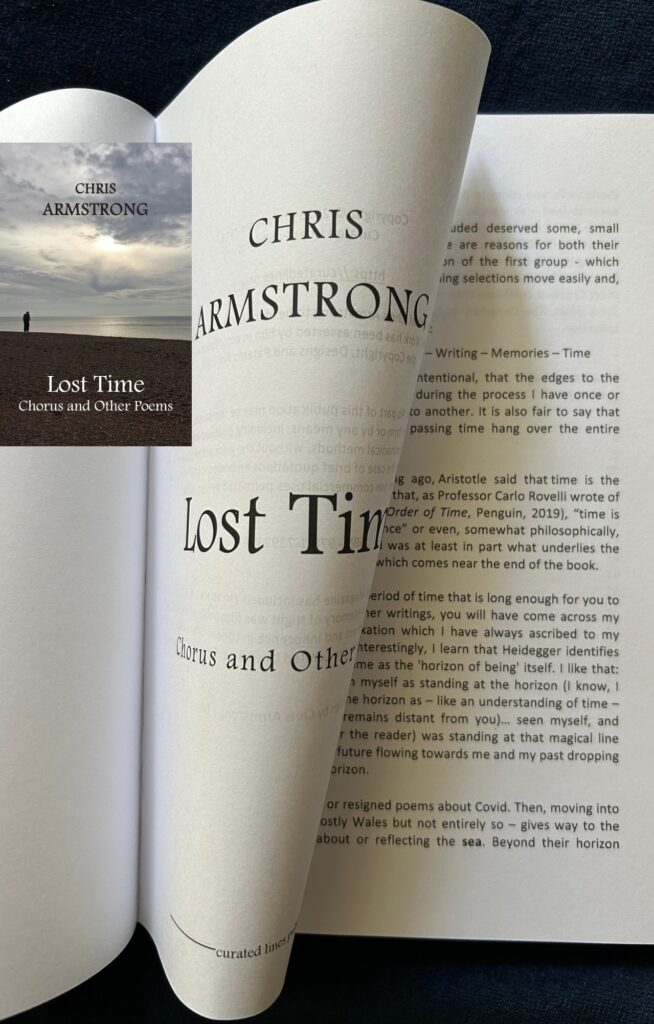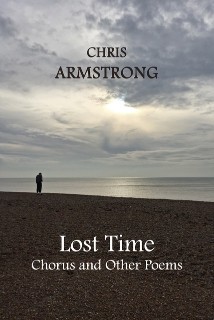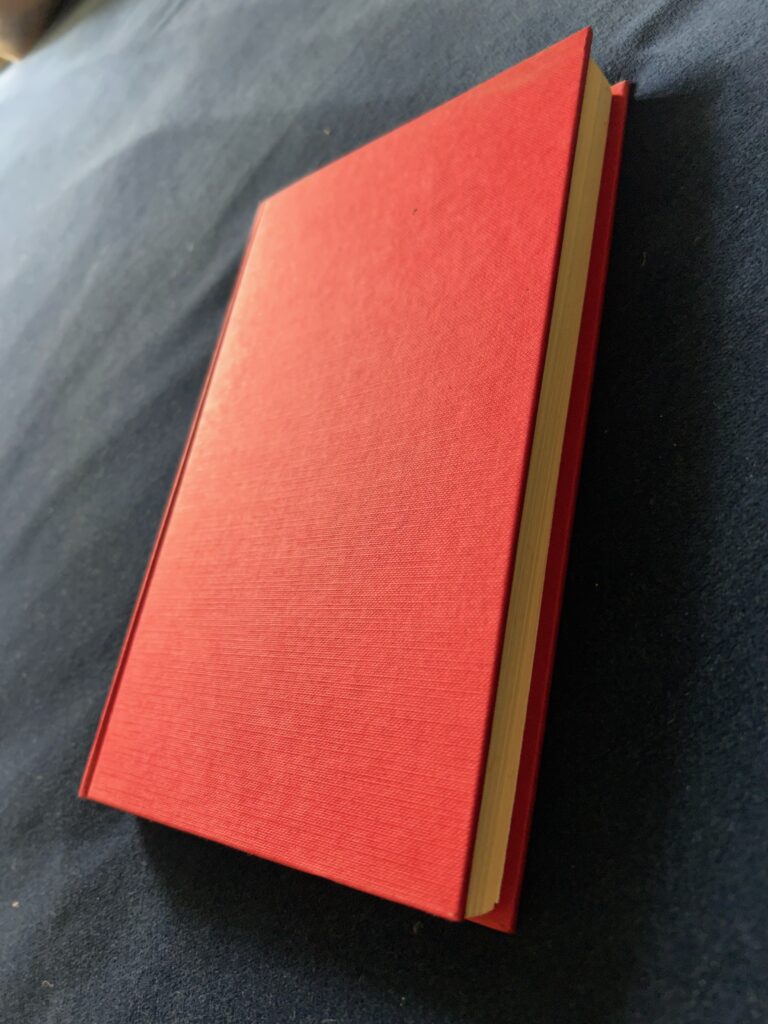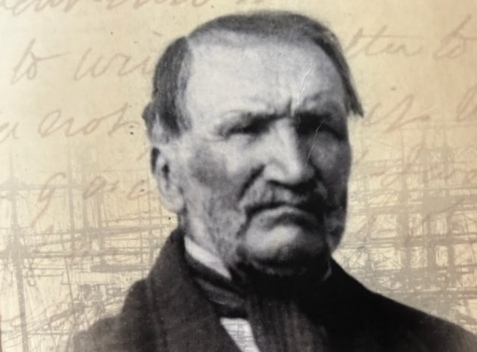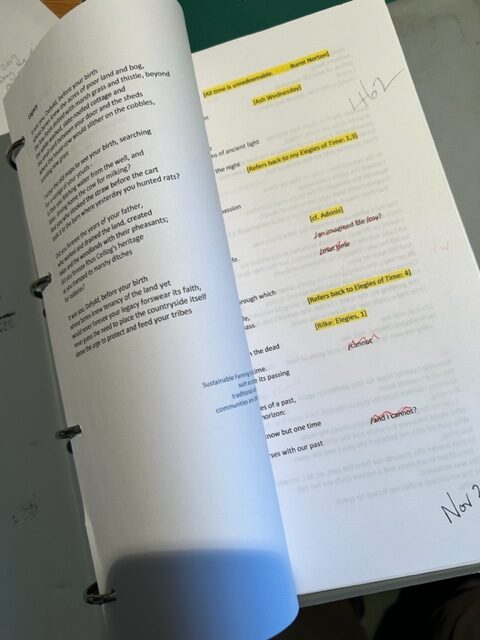I wrote about the creation of this poem back in March in a post called The Welsh Swagman…
The story of Trecefel, a farm near Tregaron begins in 1846 when, following his marriage, it became the tenancy of a man born 28 years earlier near Talsarn in the parish of Llanfihangel-Ystrad in Ceredigion. That man was Joseph Jenkins.
Bryn Du
Above Caron’s dark Teifi flow.
Beneath the white wood.
Beneath the black hill.
Sweet meadows and pastures lie
around a house
standing proud
over its land, over river waters
shining in the Spring sun as sewen
break the stillness of the surface,
over high-hedged fields
bountiful with sheep and cows, and
in proper season with corn and hay.
Beneath the black hill
men labour:
the land prospers.
The Master
I was born under an inauspicious star
in the longhouse of Blaenplwyf,
cursed even in my mother’s womb,
I was given a stony path in this suffering universe,
my mouth both my strength and my downfall.
I learned, in a minister’s school,
my letters
and, beneath the calling curlews,
all the farming that my father knew.
In a decade beneath the hill
I have made my farm a showpiece
in the county.
Now, my plough and my goose quill
are each joyous in my hand.
Before each dawn I walk
the fields and hedgerows of my land;
at day end the candle’s flicker
allows another entry in my journal:
The winter river consumes the land and
I waded shoulder deep
to save my sheep.
Six lost.
Betty
How the mighty fall:
too many years have I suffered
too many times have I left,
returning to my father’s hearth
in sad despair.
Once
our farm was the pride
of the countryside – it prospered:
in the early years at haymaking
neighbours helped our people
with the scything, raking and carting –
now our hay burns and our crops rot.
My man has lost his way
and we cannot pay our tithes.
I will not stay!
The Milford Haven and Manchester Line – the M&M Line – would connect the deep water port in South Wales to the English industrial manufacturing centre. Joseph Jenkins understood the advantages that the line would bring to agriculture and to the rural economy and gave his full support to the project, often delivering speeches and canvassing for support. He was even invited to address a House of Commons committee on the line’s benefit for rural agriculture.
The Cut
Age of steam!
I am persuaded!
I see
farms, the community
advanced by the markets
brought to us by this marvel.
I will lend my voice to the cause!
Our lives will be forever changed!
Age of steam!
Now my land is overrun!
Navvies work on the Trecefel cutting –
the workforce is tearing apart my land,
desecrating my hedgerows –
everywhere there is a mess.
Age of steam!
Steam engines pass in the fields
below the house –
y trên cawl signals our break for lunch.
Who can know what insecurity and depression, what darkness so often filled Joseph’s mind? In his diaries, he often wrote that the fates were against him – ‘I am kicked like a football in this world’ – ‘I do feel that my life has become filled with sorrow and covered in darkness’. And he hated his inability to abstain from drink. In December 1868, he wrote that he could see no sense or meaning in this life – ‘I have lost my way… Life is nothing but a catalogue of misfortune’.
After Dark
And then he was gone,
Cors Caron’s peat piled high in the yard
against the coming winter.
By night he left
quietly –
Bont Ffrainc led him away
to walk the railway line north
to Tregaron station.
He entrained for Liverpool and
gained a berth:
Eurynome,
goddess of meadows and pastures
carried him to Melbourne
Nothing
was left beneath the black hill
but the river, the meadows, the pastures
and the wife
Ophir’s Bounty
Did he believe
as those twenty-five years passed,
did he believe
as the Ophir carried him north,
his wife, his children, his farm
had kept a welcome in their hearts.
Perhaps
it was enough that Trecefel
might once again come to know his hand.
But he believed that he had to return: he knew
his heart was too deeply rooted in the land of his birth
he must be buried in his Welsh soil.
I am indebted to:
Joseph Jenkins. Diary of a Welsh Swagman 1869-1894.
Edited by William Evans. Macmillan Australia, 1977
Bethan Phillips. Pity the Swagman: The Australian Odyssey of
a Victorian Diarist. Cymdeithas Lyfrau Ceredigian, 2002


